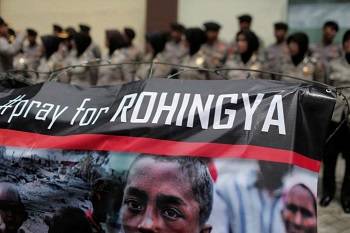An international rights group claimed Tuesday that new satellite imagery and interviews with refugees show the military was responsible for the mass destruction of Rohingya villages in a conflict-torn area near Myanmar’s border with Bangladesh.
Myanmar's government has claimed that villagers burned down their own homes to evoke international sympathy, prior to troops entering in search of people suspected of attacking police outposts, and stolen weapons.
New York-based Human Rights Watch (HRW) said in a statement Tuesday that at least 1,500 buildings have been destroyed by soldiers in the Maungdaw District of Rakhine State during military operations following the Oct. 9. attacks in which nine police officers were killed.
It underlined that images and interviews "firmly" place responsibility for the torchings with the military.
“The new findings refute the Burmese military and government’s claims that Rohingya militants were responsible for burning down their own villages,” said HRW’s Asia Director Brad Adams.
“The satellite imagery and eyewitness interviews clearly point the finger at the military for setting these buildings ablaze."
It added that the government's denial that the military are using arson as a tactic lacked credibility.
“Government officials have been caught out by this satellite imagery, and it’s time they recognize their continued denials lack credibility,” said Adams.
At least 94 people -- 17 soldiers and 76 alleged "attackers" (including six who reportedly died during interrogation) -- have been killed while some 575 suspects have been detained in military operations since Oct. 9.
Rohingya advocacy groups however claim around 400 Rohingya -- described by the United Nations as among the most persecuted groups worldwide -- were subsequently killed in the military operations in the north of the Rakhine.
The violence, the burning of Rohingya property and alleged rapes have sparked international criticism of both Myanmar's military and Suu Kyi's National League for Democracy government.
In response to growing international and regional concerns, the government last week established a commission led by Vice-President Myint Swe -- a former military general -- to investigate the attacks and allegations against the military.
With the area presently under military curfew, and access to the region blocked to aid agencies and independent journalists, HRW has called for the United Nations to assist in the probe as it says the commission’s composition and mandate raise serious doubts that it will conduct a thorough and impartial investigation.
“Blocking access and an impartial examination of the situation will not help people who are now at grave risk,” it underlined.
The vice-president-led commission will submit its findings and suggestions by the beginning of February to the president’s office.
The commission is a separate entity to the Advisory Commission on Rakhine, which is headed by former UN Secretary-General Kofi Annan and was set up to advise the government on resolving conflicts in the state.
PHOTO CAPTION
A banner is seen during a protest against what demonstrators say is the crackdown on ethnic Rohingya Muslims in Myanmar, as police stand guard in front of the Myanmar embassy in Jakarta, Indonesia November 25, 2016. REUTERS
Source: AA


 Home
Home Discover Islam
Discover Islam Quran Recitations
Quran Recitations Lectures
Lectures
 Fatwa
Fatwa Articles
Articles Fiqh
Fiqh E-Books
E-Books Boys & Girls
Boys & Girls  Ramadan
Ramadan Fatwa Audios
Fatwa Audios Month of Mercy
Month of Mercy Women
Women Eed Al- Fitr
Eed Al- Fitr Food Recipes
Food Recipes Videos
Videos

 Prayer Times
Prayer Times












